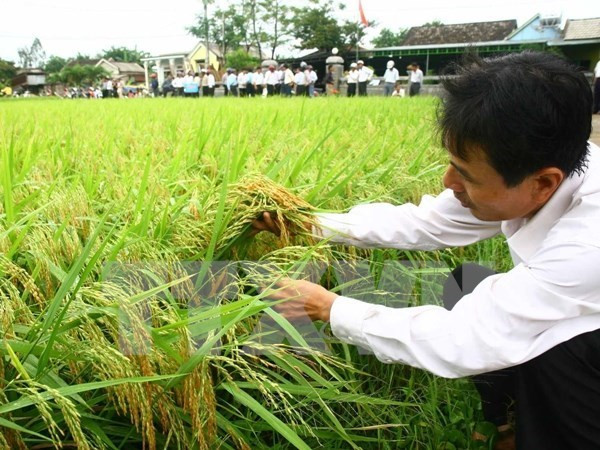 Asian investors have recently poured a significant amount of capital into the Mekong Delta, but only a few of them have gone to the agriculture sector (Photo: VNA)
Asian investors have recently poured a significant amount of capital into the Mekong Delta, but only a few of them have gone to the agriculture sector (Photo: VNA)HCM City (VNA) – Asian investors have recently poured a significant amount of capital into the Mekong Delta, but only a few of them have gone to the agriculture sector.
According to the Vietnam Chamber of Commerce and Industry (VCCI) – Can Tho branch, for the first six months of this year, the Mekong Delta attracted 79 new projects with total registered capital of 987 million USD and 51 projects increased their capital by 412 million USD .
“For the first time in the last 20 years, the Mekong Delta has attracted a lot of huge projects. Most foreign investors coming to the Mekong Delta are from Asia and they focus on agricultural processing, wind power, footwear, garments and textiles,” Nguyen Phuong Lam, Deputy Director of the VCCI – Can Tho branch told the Labourer newspaper.
These big-scale projects have focused on footwear and garments, such as the Republic of Korea’s sports shoe factory in Can Tho City with investment capital of 171 million USD, Taiwan’s Kintpassion project in Long An Province at a cost of 68.4 million USD and Korean footwear project in Long An at 25 million USD.
Meanwhile, there was only one Japanese project investing into the agriculture sector at a capital of 68,000 USD.
“Can Tho City has spent many years calling for agricultural investment but right now, we have had only three high-tech agriculture projects in Co Do and Thoi Lai districts at a combined investment capital of 44.1 million USD,” Nguyen Ngoc He , Director of the Can Tho City’s Agriculture and Rural Development Department said.
Bad weather, fluctuating prices and high risk in agricultural cultivation restricted the ability to invite foreign investors, he added.
Prof. Dr. Vo Tong Xuan, the leading Mekong Delta agricultural expert, pointed out that if local authorities want to attract foreign investors to high-tech agricultural cultivation, they must seriously implement the Government’s Decree No.35 about how to support enterprises.
“There are a lot of foreign investors worrying that on one side, local authorities call for investment but on another, they would not have any solutions to deal with emerging problems among investors and farmers,” Vo Tong Xuan added.
Professor Nguyen Mai, Chairman of the Vietnam Association of Foreign Invested Enterprises said: “There are a lot of foreign investors who would like to invest into agriculture, but they need a proper deployment method.”
He suggested the Mekong Delta should learn from the success of the central highland city of Da Lat in attracting foreign investment into agriculture.
“Each province in the Mekong Delta should define what strength they have and what are the proper policies,” he said.
“The most important thing is how to deal with the rights of farmers. If we do not have a strict contract and modern cultivation, farmers will be ready to sell their products when the market price is higher,” Mai warned.
He also pointed out that it was hard to apply high technology to small plots of land for cultivation in Vietnam.
“The Mekong Delta has a great advantage in agricultural cultivation, but it has not got any successful model,” he stressed.
“We need a strong policy to attract foreign investors. We have to go, to meet and to invite them rather than to wait,” Tran Huu Hiep, Head of the Southwest Steering Committee’s Economic Department said.
“Attracting more foreign investment into agriculture should be done along with promoting creativeness and long-term investment,” he added.
“Training for skilled workers, professional agricultural labourers is a must to meet the demand of foreign enterprises. Vietnamese partners and local enterprises in the Mekong Delta should increase their own capability to co-operate with foreign partners,” he stressed.-VNA





























